- Home
- Gail Carriger
Imprudence Page 26
Imprudence Read online
Page 26
Primrose put down her teacup with a clatter. Her eyes were fixed on Tasherit. The werelioness looked like she was trying not to be ruffled by such a long list of enemies.
Rue let out a breath. “That’s a surfeit of interested parties. Could you elucidate further?”
Floote tilted his head. “The Templars are more concerned with your mother’s kind, and likely you, than with shape-shifters, but that doesn’t mean they don’t want to kill them. A new kind of immortal is a new kind of threat, so the Templars might send agents out of curiosity. Or they might prefer to finance others. Depends on how taxed their resources are right now. I’m afraid I’ve been out of the European loop. Regardless, it never pays to discount the Italians.”
Rue nodded. Her mother had mentioned Templars. She’d called them disagreeable fellows with a predilection for delicious food and lopping the hands off of preternaturals, religious zealots with funny ideas about immortality, nightclothes, and daemons. “You take my advice, infant, avoid Italy. It’s not worth it, even for the pesto.” Since Rue did not want her hand lopped off – preternatural policy likely extended to metanaturals – she had stayed out of Italy. Regretfully, as they were renowned for their pastries.
“And how would we know them?” Rue asked.
“Templars wear white tabards with red crosses. They aren’t above hiring outside aid, but there would be at least one present to watch the operation.”
Rue had to be grateful for Floote’s knowledge and his willingness to share. There was a lot, she was beginning to realise, that her mother and father had tried to teach her about evil and enemies and secret societies. She had either blithely ignored it, or thought it unlikely to apply to her, or not realised its import at the time. If she had, she might have asked more questions.
“And the Order of the Brass Octopus?” she asked, hopeful.
“They’re different, vested in keeping themselves secret.”
Rue pushed. “And they are?”
“A society of concerned scientists that occasionally interferes in politics when they feel the world needs a nudge. I haven’t seen hide nor hair of them for” – he frowned – “well over a decade, possibly two. You might ask our young friend there.” He tilted his head in Quesnel’s direction.
Quesnel flushed as the entire table turned various levels of anger, interest, and concern in his direction. He raised both hands. “Whoa there. You can check me for the tattoo. I’m not a member.”
Rue was tolerably certain, and she could feel herself heating up at the possibility of having to acknowledge this to everyone in the stateroom, that Quesnel hadn’t a single tattoo anywhere on his body. She’d conducted a complete inventory on more than one occasion. She would defend him if it came to that – no one deserved to be wrongly accused. However, it was one thing to hint to her friends about fraternisation and quite another to confirm it publicly.
Fortunately Quesnel said, “My mother was OBO. Is she up to her old tricks? I don’t think so.”
“It’s not her we’re worried about,” said Rue. At least I don’t think it’s Mother’s old chum. Rue had never entirely trusted Madame Lefoux. Partly because on those occasions when she’d observed them together, they did seem so very chummy.
Quesnel watched her for signs of suspicion. “You want to know if the OBO is still active?”
“Is it?”
“Likely, yes. I declined to join. Secret societies are too old-fashioned for words. Haven’t heard from them since. Regardless, I doubt they’d ally with the Templars – opposing views.”
Floote agreed. “The OBO is likely a better ally for sportsmen and collectors. Of the two, let’s hope it’s them.”
“Why?” Rue asked.
“Templars like to kill first and ask questions later. The OBO would rather experiment first and kill later. Either way you end up dead, but at least with the OBO there’s a chance of escape.”
“Very optimistic.” Miss Sekhmet looked, if possible, even more worried.
Primrose poured her another cup of iced milk.
They were two days out from Wady Halfeh. All that first afternoon, they floated high and fast over the gates of the cataracts. Anyone free of shipboard duty hung over the railings staring down at the widening of the Nile below. The great river became a near lake, dotted with white rapids and the peaks of a thousand varied islands – rocky, sandy, or covered in palm trees. During the night, they floated over Assûan, a town so small they barely marked it passing. Dawn had them at the second cataract. Rue had never before wished to explore groundside so badly. The fierce beauty of the place drew her, the rapids forming a barrier so inhospitable that no villages edged this Nile, yet the scattered lush islands were the stuff of fairy tales.
They continued on, over the unmarked Nubian border, finally arriving at Wady Halfeh. At first glance it was similar to all the previous villages in Egypt. The buildings built of mud-brick with tile roofs, all tan, yellow, and orange. Paths cut from it out into the desert in sand wheel-whorls. But as they de-puffed, it became apparent that Wady Halfeh was different.
The town jutted up on pillars fully three storeys high, out over the Nile. It was constructed to allow for the annual flood, but its focus seemed turned to the desert, looking to the camel trails for trade because the river was too fraught to provide. Tall industrial pipes spiralled into the skies like obelisks, smoke gusting out. This shrouded the town in sooty gloom, not as much as London, but only because the Nile’s persistent breeze carried some particulate away. Still, it covered much of Halfeh in a layer of grime, making the town grungier than the desert around it.
From above, it looked like a great big smudge.
This place was more a creature of the modern age, as Rue had come to understand it, than any she had seen in Egypt. She half expected to find a railroad, spearing out into the desert towards Abu Hammed.
“The desert eats it up,” Anitra explained when Rue asked. “The tracks, I mean. It’s been tried but it never lasts. One could parallel tracks along the Nile, as they do in the Delta, but the flooding is less predictable here. It’d have to stop half the year and then be dug out after. So, with no train, Wady Halfeh does the heavy lifting for aircraft in these parts.”
Rue nodded her understanding. “There’s always lot of airships where trains can’t go.”
“Exactly.”
Rue nodded. “Can’t complain. After all, we intend to refuel here.”
“Nubia has a few way stations further south. But respectable dirigibles don’t moor there unless it’s an emergency. Even then I wouldn’t recommend it. At least Wady Halfeh has some laws.”
Rue nodded. “Understood. Percy, take us down.”
The Spotted Custard sank down, de-puffing in stages towards what looked like the main dockyard. It wasn’t designed up, like most dirigible service ports; instead it soared out over the Nile, bringing airships in low to tether to one island or another.
“We are responsible for our own water intake while moored?”
Anitra nodded. “Coal transfer takes place via a centralised venting system in the centre of town. See there?”
“Percy, take us there first, please.”
The coal-dispensing station looked like a massive cauldron, with holes plus anchor points at various junctures, like a strawberry pot. They were hailed the moment it became clear they were in need of fuel and directed into one vent by the gesticulations of a precariously stationed native boy.
Spoo supervised as they let out the lines to a group of eager local sooties whose hands reached out from the cauldron interior in an eerie disembodied manner. Like a poltergeist.
Anitra undertook a rapid haggle over cost.
Primrose, as ship’s purser, stood by wearing a deeply contemplative expression more common when deciding how to dress for a ball.
For a price that Prim deemed just shy of extortionist, a tube was ejected outward and connected to the open porthole of The Spotted Custard’s boiler room. Coal was transferred aboard and
gold transferred off. Transaction complete, they were gestured rudely away by the disembodied hands.
Rue directed Percy to moor far out over the rapids, at the most isolated island.
She still felt their position exposed. True, there were white-water rapids between them and shore, but there were also rope bridges aplenty and small light aircraft developed exactly to deal with the difficulty inherent in living near cataracts.
“I don’t like this, Lady Captain. We’re awfully easy to board.”
“Agreed, Spoo. But what can we do? We need water and this is the only way to take it on.”
Tasherit joined them, leaning over the forecastle rail.
“Not a particularly defensible military position.” Her attitude was deceptively casual.
“Nevertheless,” said Rue, “I’m afraid you must guard us against attack.” She looked down at her small shadow. “No shore leave, Spoo. Apologies.”
“Understood, Lady Captain.”
Quesnel appeared.
“Must everyone come up top right now when we are at our most vulnerable?” Rue asked the world at large.
“Got to supervise the water coming in, Lady Captain. It’s not easy to draw off rapids.”
“Fine. Just please be careful.”
“Didn’t think you cared.”
Rue glared.
Quesnel glared back.
“Softly, you two.” Miss Sekhmet was the only one brave enough to modulate the crackling friction between captain and chief engineer.
Rue considered Spoo’s finer feelings and relented by walking away.
Miss Sekhmet strode the deck, stationing armed deckhands and decklings at various points, including up the sides of the balloon in lookout positions. She kept her own pistol at the ready. Spoo and Virgil manned the Gatling gun, although they were under orders not to use it in port unless given a direct command. Meanwhile, Quesnel, with Anitra on his arm, oversaw the sooties as they telescoped the hydrology tube down to sink into the rapids. It took seven tries to find a point deep enough not to break the pumps with too much air intake.
Rue carried her Parasol-of-Another-Colour open against the sun – it was greenish today – reassured in the knowledge of its armament. Acid was effective on everyone, and she wore goggles on her hat to pull down upon emission. She’d refilled its complement of lapis lunearis, lapis solaris, and lemon and basil tincture from the ship’s medical cabinet. Thank goodness Primrose kept that fully stocked. She’d ensured the parasol’s remaining four numbing darts were loaded. It occurred to her that, if necessary, the lemon and basil tincture might be added to barley water, improving taste and mood in one dose. The idea put a spring in her step.
Primrose wanted to leave The Spotted Custard in search of a marketplace.
“Absolutely not.” Rue twirled her hideous parasol in frustration.
“But, Rue, we’ll run out of food eventually.”
“How soon is eventually?”
“Well, three weeks. But we’ve no milk at all.”
“Too hot for tea anyway.”
“You aren’t being reasonable. I’ll be safe.”
“No, Prim, I can’t spare the manpower to guard you if we don’t need stores that badly.”
“Tell that to Cook.”
“You tell it to Cook. Needs must.”
“I hate it when you say that. You sound like your mother.”
“Don’t be cruel. Now go below, please. And take your brother with you.”
Primrose sulked but did as Rue asked. “Come along, Percy. I’m sure there is something you need to research and we should keep an eye on Footnote.”
Percy was remarkably docile. “Indubitably. I was wondering about desert fauna and the relative frequency of sand fleas only yesterday.”
Rue was suspicious. She had long since realised Percy only got publicly pedantic about his studies when he was trying to cover something up. His emotions. Or his real interest. Or his activities. Or some less savoury research.
Perhaps it was because they were so very prepared.
Or perhaps their mysterious enemies hadn’t any contacts in Wady Halfeh.
Or perhaps the town was simply too wrapped up in its own business.
But no attack came.
The Custard was able to set back out only a few hours later in relative harmony.
Everyone stayed tense, though. A gaggle of off-duty decklings remained glued to the aft railing, scanning the northern skies beyond their Drifter escort for hunters to reappear.
Perhaps the enemy’s repairs took longer than estimated. Or perhaps the Custard’s refuelling in record time gave them a consistent lead, but no one else broke the skies. They had the whole world to themselves as they left Wady Halfeh far behind and headed into the desert. The Nile disappeared. The moon rose into the sky, and below them was nothing but rolling sands and the jagged shadows of craggy rocks.
For the first time, Rue moved beyond the long arm of the British Empire. It felt terrifying and freeing all at once. A little like attaining her majority. They glided into skies even the East India Company feared to float. It was dangerously peaceful.
That evening they dined under the stars. Their Drifter escort made silent shadows about them touched by the occasional glimmer of lantern light.
After dinner, Rue, feeling antisocial, leaned over the rail near the quarterdeck, watching Primrose, Percy, Tasherit, Anitra, and Quesnel talk on the forecastle. The gentlemen and Anitra puffed small cigars. A marker of how casual shipboard life became was that they did so without smoking jackets. Quesnel’s blond head bent solicitously as he listened to something Anitra said. The group laughed. Their humour tinkled out over the silent night and died in the sands below.
Floote caught her staring. “He turned out a better man than I expected.”
“Quesnel or Percy?” Rue paused and then added, “Or Tasherit?”
The former valet gave a chuckle. “Quesnel. He was quite the rascal.”
“And now he is quite the rake. You might warn your granddaughter.”
“Might I?”
“I would.”
“For your good or for hers?”
“Ouch. Were you this blunt with my mother?”
“I said very little.”
“Because she didn’t need help?”
“I’m too old to sit idly by and watch young people be foolish with their hearts.”
That made Rue smile. “I thought that was what old people did – allowed us to repeat their mistakes.”
“Perhaps.”
“You think he is really interested in Anitra?”
“I think we seldom regret the risks we take as much as the times we did not try at all.”
Wonderful, now he talks in riddles. Rue looked at their balloon shadows, grateful that they weren’t alone above an unkind world.
Floote followed her gaze, leaning his old bones against the railing. His breath was shallow and quick, although he had not exerted himself.
“I am still amazed they agreed to come.” Rue thought it might be intrusive to ask about his health.
“They are curious about you. And about Lady Sekhmet.” He gave the werecat a title, as if she were nobility. “One of the reasons to keep her from meeting them initially.”
“Ah, I see now.”
“Ironic, really. That they rush to keep her kind from becoming slaves, when shape-shifters once enslaved all Egypt.”
“I know Ancient Egypt was once werewolf ruled. The God-Breaker Plague was born to cast the wolves out. Are you saying it wasn’t wolves or that it wasn’t wolves alone?”
Floote’s lined face was thoughtful. “Your grandfather once uncovered a tomb containing the mummy of a jackal-headed creature. There is good reason to call it Anubis form. Mr Tarabotti kept it secret. He was a man who preferred secrets. Ironic that it is you, half a century later, who broke that seal and exposed the world to the fact that there are more than just werewolves changing shape around us.”
“To be fair,
it was Quesnel and Percy who did that.”
Floote raised one eyebrow at her.
Rue considered the past, frowning. “How many animal-headed gods were there in the Egyptian pantheon?”
“Enough to keep you busy hunting a long time, Alessandro’s granddaughter.”
“Back then, were werelionesses really so bad?” Floote was clearly a resource. Rue was surprised to find she admired him for it. She was beginning to realise she’d wasted opportunities to learn from her parents. Her mother’s history was fascinating. Rue had always thought her so staid and old-fashioned! She refused to be so foolish now.
“The pharaohs of Egypt controlled vast numbers of slaves with crook and flail. And the living gods controlled the pharaohs. I would say the werecats were as bad as any other. Until they realised their mistake might be deadly.”
Unheard, for she had silent feet even without a cat form to call upon, Tasherit joined them. Rue jumped when her perfect profile suddenly appeared on the other side of Floote, silhouetted against the waning moon.
She said, “We were the first to abdicate.”
Floote nodded at her. “There are no great cats on the walls of tombs built after the Middle Kingdom.”
“There were so few of us left at that point. And we were tired of ruling. Cats have never played nice with others.”
Rue gave her a suspicious look. “Are you trying to tell me cats gave up being gods? Preposterous.”
Floote gave a dry chuckle. Tasherit did not respond.
Rue tried another question, gesturing at the nearby balloons with a sweep of her hand. “You think the people of Egypt forgive you their long imprisonment?”
“Humans have short memories.”
Rue cocked her head. “Even Drifters?”
“Ah, but they were never ours to begin with. They had no flight back then, but they were always nomads. We could no more hold them than we could the shifting sands. This is no betrayal of history, them helping us now.”

 Romancing the Werewolf
Romancing the Werewolf Romancing the Inventor
Romancing the Inventor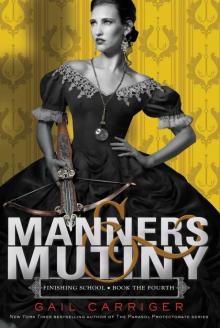 Manners & Mutiny
Manners & Mutiny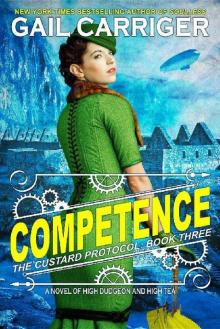 Competence
Competence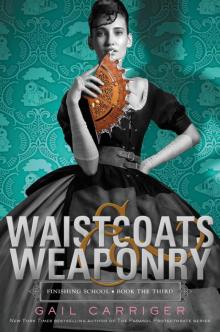 Waistcoats & Weaponry
Waistcoats & Weaponry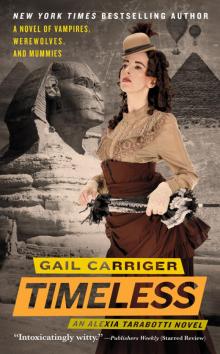 Changeless
Changeless Blameless
Blameless Soulless
Soulless Curtsies & Conspiracies
Curtsies & Conspiracies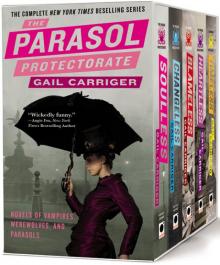 The Parasol Protectorate Boxed Set
The Parasol Protectorate Boxed Set D2D_Poison or Protect
D2D_Poison or Protect Funny Fantasy
Funny Fantasy Defy or Defend
Defy or Defend Imprudence
Imprudence Reticence
Reticence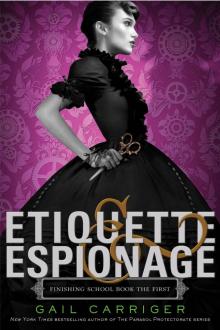 Etiquette & Espionage
Etiquette & Espionage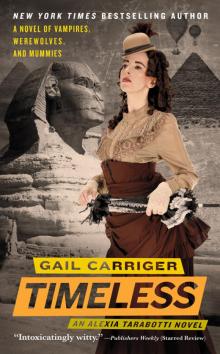 Heartless
Heartless Prudence
Prudence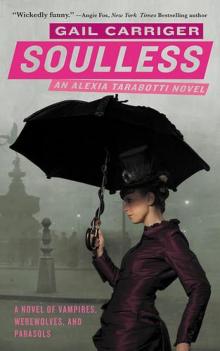 Parasol Protectorate 01 - Soulless
Parasol Protectorate 01 - Soulless Fairy Debt
Fairy Debt My Sister's Song
My Sister's Song Changeless: The Parasol Protectorate: Book the Second
Changeless: The Parasol Protectorate: Book the Second Soulless: The Parasol Protectorate: Book the First
Soulless: The Parasol Protectorate: Book the First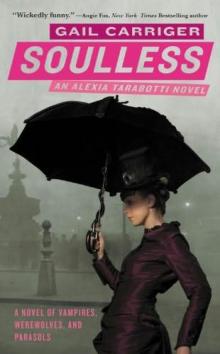 Soulless pp-1
Soulless pp-1 Changeless pp-2
Changeless pp-2 Heartless: The Parasol Protectorate: Book the Fourth
Heartless: The Parasol Protectorate: Book the Fourth Meat Cute
Meat Cute Etiquette & Espionage (Finishing School)
Etiquette & Espionage (Finishing School) How To Marry A Werewolf (Claw & Courtship Novella Book 1)
How To Marry A Werewolf (Claw & Courtship Novella Book 1)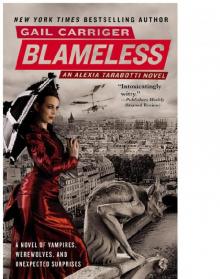 Blameless: The Parasol Protectorate: Book the Third
Blameless: The Parasol Protectorate: Book the Third Heartless pp-4
Heartless pp-4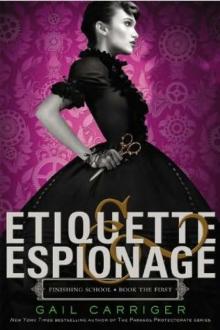 Etiquette & Espionage fs-1
Etiquette & Espionage fs-1 Romancing the Inventor: A Supernatural Society Novella
Romancing the Inventor: A Supernatural Society Novella Curtsies & Conspiracies fs-2
Curtsies & Conspiracies fs-2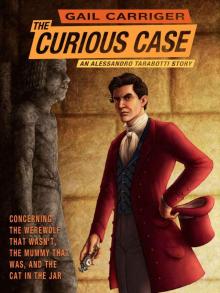 The Curious Case of the Werewolf That Wasn't, the Mummy That Was, and the Cat in the Jar (The Parasol Protectorate Book 6)
The Curious Case of the Werewolf That Wasn't, the Mummy That Was, and the Cat in the Jar (The Parasol Protectorate Book 6) Blameless pp-3
Blameless pp-3